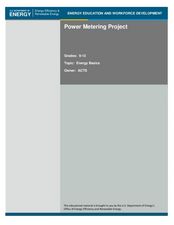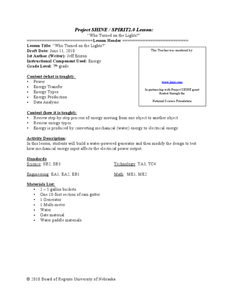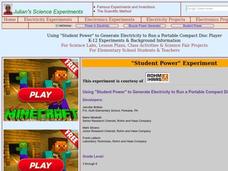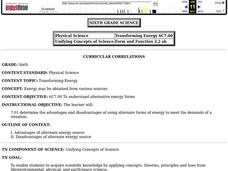PHET
Generator
Michael Faraday was self-educated, earned an honorary doctorate from the University of Oxford, invented the first Bunsen burner, discovered the laws of electrolysis, and proved that a changing magnetic field produces a current. In this...
Curated OER
Photosynthesis and Biomass Growth
Sixth graders examine renewable energy sources such as ethanol. In this photosynthesis and biomes lesson students complete a project on farming techniques.
Curated OER
Power Metering Project
Learners collect and analyze variable data and understand the concept of electrical power. In this energy instructional activity students use a spreadsheet to manage their data and create box plots.
Curated OER
Water Power
Learners observe a model of a waterwheel to investigate the transformations of energy involved in turning the blades of a hydro-turbine into work. They work as engineers to create a model for a new waterwheel while considering resources,...
Curated OER
A Hilly Ride
Fifth graders investigate situations that show how kinetic and potential energy are exchanged. They determine how friction is a source of energy transfer from kinetic to thermal energy by experimenting with a car and track. They answer...
Mr. E. Science
Electricity and Magnetism at Work
I don't get electricity jokes, watts so funny about them? The 13th in a series of presentations covers energy, motors, currents, generating electricity, calculating electrical energy cost, transformers, and batteries.
National Renewable Energy Laboratory
Biomass: Biogas Generator
It's a gas. Middle schoolers build a biogas generator following the directions in this resource. After a few days of observation, they demonstrate that the gas given off by the decomposing manure is flammable. The activity concludes as...
Curated OER
Robot Earth
Students construct a simple robotic energy transformer. In this space science lesson, students explain how energy is transformed from one form to another. They identify the different uses of robotic devices.
Curated OER
Who Turned on the Lights?
Seventh graders discuss how energy is transformed from one form to another. In this physics instructional activity, 7th graders design and build their own hydro generator. They identify the factors that affect its energy production.
Curated OER
A River Ran Through It
Students research how water is used to generate electricity. They investigate water's potential-to-kinetic energy transfer in hands-on activities about falling water and waterwheels. They take measurements, calculate averages and graph...
Curated OER
Human Activity and the Environment 2004
Students brainstorm the ways we use energy sources in our daily lives and what our lives would be like without it. They answer questions based on sections from the Human Activity and the Environment 2004, "Energy in Canada" article.
Curated OER
Pendulum Power
Eighth graders study the Law of Conservation of Energy and the Second Law of Thermodynamics. they create a pendulum out of either a rope with a bowling ball or barbell tied to one end.
Curated OER
Energy Dreams by Design
Students explore a new home and design some of its electrical features. They construct a model of the electrical features and consider accessibility for the handicapped into the room. In groups, students analyze the advantages and...
Curated OER
Looking into Surface Albedo
Students demonstrate how the color of materials on Earth affect the amount of solar energy that is absorbed. In this solar energy lesson students complete a lab to explore how the color of materials on the Earth's surface impacts warming.
Curated OER
They Don't Just Eat Grass
Students explore and examine different types of feed used for livestock. They discuss types of feed, the need for energy and health, and create graphs of food compared to categories. Students organize data and complete worksheets on...
Curated OER
Using "Student Power" to Generate Electricity to Run a Portable Compact Disc Player
Students explain the relationship between magnetism and electricity. In this physics activity, students describe the transformation of energy. They create an electromagnet and investigate the factors affecting its strength.
Curated OER
Completing the Circuit
Students use a battery, wires, small light bulb and a light bulb holder to learn the difference between an open circuit and a closed circuit, and understand that electric current only occurs in a closed circuit. They describe the...
Curated OER
Electricity and Magnetism: From Fun to Function
Fourth graders experiment with electricity and magnetism and build an electromagnetic motor. In this electromagnetism lesson, 4th graders use household objects to show electrostatics and magnets and compasses to show magnetism. They...
Curated OER
How Much Energy is a Kilowatt Hour?
Students study the conservation of energy. In this energy lesson plan students explain the differences between potential and kinetic energy.
Curated OER
Transforming Energy
Sixth graders study about alternate energy sources and discuss with their neighbor how alternative energy sources affect environmental conditions so that an entire species could be affected.
Exploratorium
Vocal Visualizer
Make sound visible with an activity that provides directions for how to build a vocal visualizer meant to create light patterns. Making noise into the visualizer causes a mirror to vibrate, reflecting a laser beam, and creating the...
Rochester Institute of Technology
Molecules and Fuel Cell Technology
A fuel cell is where the jailer keeps gas guzzlers. Scholars review chemical reactions, chemical bonds, and chemical structure in order to apply these concepts. Participants construct fuel cell kits, using electrolysis to run the car and...
American Association for the Advancement of Science
Sensing the Invisible: The Herschel Experiment
Learners of light will construct a contraption in which light is passed through a prism and shone into a box. The temperatures at different points along the path and outside of the path of light. The intent is to imitate William...
Curated OER
Transformation of Energy- Sound
Sixth graders investigate how sound is made by vibrating matter. They work with a ruler and a rubber band to produce different types of vibration which makes different pitches of sound. They record their observations of the noises made...

























